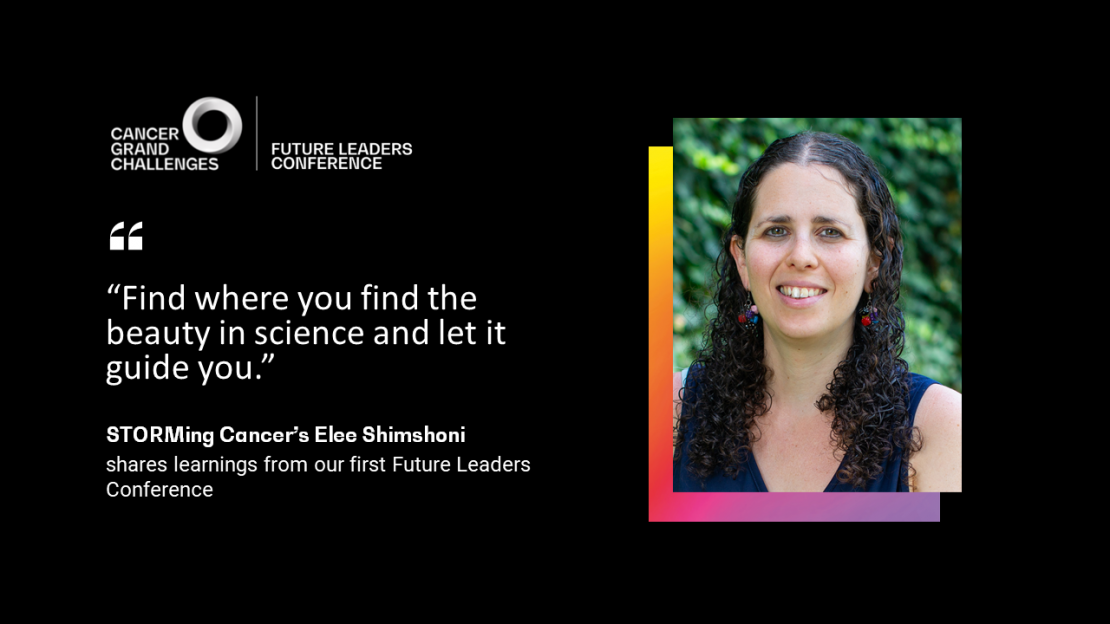In October 2021 we held our first Future Leaders Conference, a chance for the early career members of our community to come together virtually, discuss their work and focus on professional development.
The event was powered by a steering committee of Cancer Grand Challenges postdoctoral fellows and PhD students, including the STORMing Cancer team’s Elee Shimshoni. Here, Elee shares her thoughts on the event and the keynote speech.
The Cancer Grand Challenges community brings together numerous types of expertise and techniques, all aimed at advancing cancer research.
For those with their “boots on the ground” – us, the trainees, the graduate students and postdocs who carry out experiments and analyze data – communication between one another has the highest potential to lead to fruitful collaborations. In addition, we’re all at a stage in our career where networking is crucial, and the connections we make can expand our peer and support circles as we advance in our careers.
This is why I joined the steering committee for the Cancer Grand Challenges Future Leaders Conference, helping to influence the content and open discussion on topics auxiliary to a scientific career.
“Seek support in the people around you”
We started each day with lightning talks – providing delegates an opportunity to give a quick overview of their work, and attendees the chance to hear a lot of great ideas in a short period of time. On day 2, we followed this with an insightful panel focused on career development, featuring Nature Genetics editor Safia Danovi, video game designer and entrepreneur Owen Harris, assistant professor Julia Drewes and biomedical engineer Judit Giró Benet. Each day closed with breakout rooms for networking and discussion, and it was great to witness people taking a lot of interest in each other’s research.
We also arranged a keynote address – and were excited that Uri Alon agreed to take part, accompanied by a guitar and a Q&A box. Uri is a pioneer in the world of systems biology who writes, advocates and even sings about the importance of human relationships in science.
Here are my top 5 takeaways from Uri’s keynote:
- We can all be agents of change in our own realm: we can be better reviewers, grant committee members, mentors and peers.
- Real-life research is never as straightforward as depicted in scientific papers, grant proposals or scientific hero stories: you usually step into a “cloud” of uncertainty in between your initial hypothesis and your final discovery or conclusion. True scientific innovation lies within this “cloud”, since that is where non-trivial ideas can be found. Watch Uri go into more detail about the “cloud” in his TED talk, here.
- Find what drives you and where you find the beauty in science and let it guide you to the research questions that you would like to pursue. Uri mentioned that in his case it is finding simple rules within complex systems.
- Seek support in the people around you – find and be grateful for that colleague, lab-mate or supervisor who is a good listener, who can “hold your hand” as you master new skills or a come to a new lab and help you get through the cloud. Check out Uri singing about this in Mike's Song, here.
- It’s important to have conversations or even a language to describe the not-so-glamourous parts and the mental challenges of science in order to bring change to scientific culture.
Enabling each other to grow
A theme I felt emerging throughout the event – especially from the Q&A during Uri’s keynote, but also during the breakout sessions – was the issue of work-life balance and a healthy environment and culture. Among us future leaders, there is significant thirst for seeing a scientific culture that is more geared toward fostering and sustaining both a healthy work-life balance and a collaborative, collegial research community in which researchers enable each other’s growth – rather than impede it.
Elee is a postdoc at the Wyss Institute for Biologically Inspired Engineering, US; Uri leads the Design Principals in Biology lab at the Weizmann Institute, Israel. Both are members of the STORMing Cancer team: learn more about the team.
